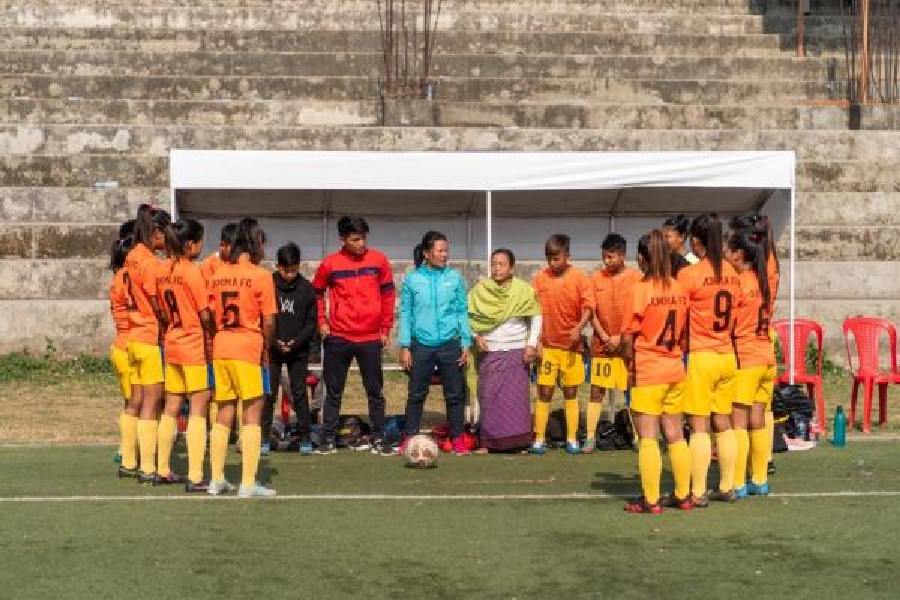We call her ebo Laibi,” says footballer Phanjoubam Nirmala Devi — she played in the Indian Women’s League in Goa not so long ago. The 21-year-old had trained as a teenager at the Andro Mahila Mandal Association or AMMA, a football club in Andro village in Manipur. Laibi Devi is the president of that club.
“Ebo in Manipuri means grandmother. She treats us like her grandchildren,” says Nirmala Devi. “She does not play football but spends all her time, money and energy on training the young girls of the village and sponsors them so they can go out of the state to play,” she adds.
It is next to impossible to meet Laibi in person, that is, if you are not travelling to Manipur. She has never stepped outside her village. “She has worked amongst us, silently and resiliently,” says Nirmala Devi.
When The Telegraph connected with Laibi over telephone, she spoke about how Manipur is a powerhouse of sports and how women are embracing sports readily; there was a third person on the line, Meena Longjam, who played the role of a translator. Longjam has made a documentary titled Andro Dreams based on Laibi Devi’s story.
Laibi spoke about her early life, her engagement with social work, her political ideology and how she wanted women to become self-reliant. She talked about how during her college days she was deeply influenced by the life and works of Hijam Irabot — the Communist leader and activist from Manipur. She got involved in social work in the mid-1970s and started her fight against social evils such as child marriage, drug abuse and domestic violence.
Andro is on the outskirts of Imphal, perched on a hilltop. It has seen many political upheavals. “The chief livelihood of people is farming. They are poor but the literacy rate is high at 66.67 per cent,” says Longjam.
In Andro Dreams, Longjam has used the scenic beauty of the place as the ironic backdrop to the struggles of the women there. Apart from interviews with Laibi, a considerable portion of the documentary has to do with her conversation with a promising footballer who left her sports career midway. The film received the Best Documentary Award at the Mumbai Film Festival in 2023.
Longjam, who was in Calcutta earlier this year to attend the Kolkata People’s Film Festival, says, “Manipur has always produced good sportsmen and women. I am happy that this film is being screened at a time when the state is going through such a bad time. I believe football is going to help us cope with this socio-political strife. Women’s football would be a good way of venting anger and frustration and bringing back peace... Fingers crossed.”
Manipur has witnessed frequent ethnic strife, arising from the clash of “nationalisms” and demands for sovereignty in varying degrees. Ethnic violence between the Meiteis and Kuki-Zos engulfed the state a year ago, killing 200 people and displacing over 60,000.
A retired schoolteacher, Laibi is probably the only woman in Manipur who runs a football team. The club too is an women only club. Longjam looked her up after reading a newspaper report. She came away fascinated and decided to document Laibi’s effort of 38 years.
Laibi used to teach geography at a local school. Post-retirement she spends her free hours running businesses such as sericulture, making local liquor and weaving. “The first time I met her, she was cleaning a large handloom unit. I was surprised to see a tiny woman, barely 4-foot, cleaning a room that could accommodate 10 handlooms,” says Longjam. She shot the documentary in four phases to get a sense of what Laibi did throughout the year.
“In Andro, girls are married off pretty early. They do not complete their education, they do not get to earn or live a life of their choice once they are married,” says Laibi in the film. But she completed her education, and is the first woman from her village to have completed college.
She started the football club in the 1980s, when the youth of Andro were getting involved in political, revolutionary activities.
Nirmala Devi adds to this narrative. She says, “Ebo Laibi believes in women’s empowerment. She is not married. She spent her entire youth looking after us. She kept telling us that we have to first learn to fend for ourselves, earn money and build an identity; not simply marry and look after the household.”
Besides football, Laibi provides computer training classes and teaches the girls to weave. There is a small farm where they learn sericulture. However, her main focus is
football. She sponsors her girls so they might go and play in Haryana, Chandigarh, Karnataka...
The story goes that she was bitterly disappointed when the young footballer featured in Longjam’s film eloped. Laibi refused to meet her, talk to her, and wouldn’t allow her to be a part of the club. In time, though, she thawed. Laibi says, “She had been selected for the national under-14 team and had also been picked by a club in Karnataka. But she became pregnant and now her life naturally revolves around her child and family.”
Well, there are goals and there are goals.











